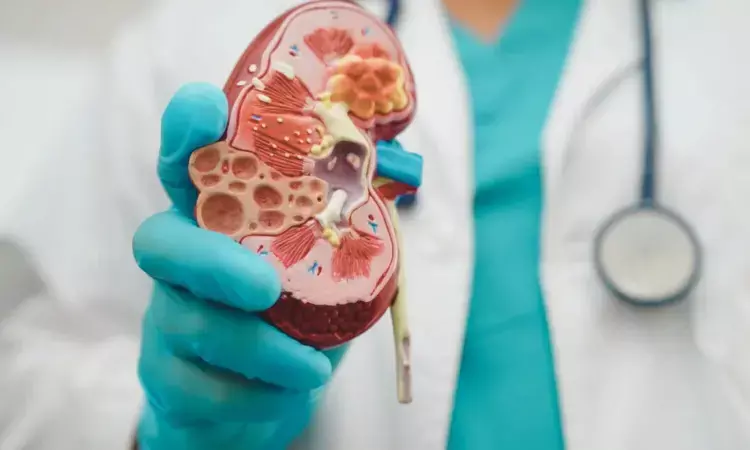- Home
- Medical news & Guidelines
- Anesthesiology
- Cardiology and CTVS
- Critical Care
- Dentistry
- Dermatology
- Diabetes and Endocrinology
- ENT
- Gastroenterology
- Medicine
- Nephrology
- Neurology
- Obstretics-Gynaecology
- Oncology
- Ophthalmology
- Orthopaedics
- Pediatrics-Neonatology
- Psychiatry
- Pulmonology
- Radiology
- Surgery
- Urology
- Laboratory Medicine
- Diet
- Nursing
- Paramedical
- Physiotherapy
- Health news
- Fact Check
- Bone Health Fact Check
- Brain Health Fact Check
- Cancer Related Fact Check
- Child Care Fact Check
- Dental and oral health fact check
- Diabetes and metabolic health fact check
- Diet and Nutrition Fact Check
- Eye and ENT Care Fact Check
- Fitness fact check
- Gut health fact check
- Heart health fact check
- Kidney health fact check
- Medical education fact check
- Men's health fact check
- Respiratory fact check
- Skin and hair care fact check
- Vaccine and Immunization fact check
- Women's health fact check
- AYUSH
- State News
- Andaman and Nicobar Islands
- Andhra Pradesh
- Arunachal Pradesh
- Assam
- Bihar
- Chandigarh
- Chattisgarh
- Dadra and Nagar Haveli
- Daman and Diu
- Delhi
- Goa
- Gujarat
- Haryana
- Himachal Pradesh
- Jammu & Kashmir
- Jharkhand
- Karnataka
- Kerala
- Ladakh
- Lakshadweep
- Madhya Pradesh
- Maharashtra
- Manipur
- Meghalaya
- Mizoram
- Nagaland
- Odisha
- Puducherry
- Punjab
- Rajasthan
- Sikkim
- Tamil Nadu
- Telangana
- Tripura
- Uttar Pradesh
- Uttrakhand
- West Bengal
- Medical Education
- Industry
Study Shows Variable Response to Spironolactone in IgA Nephropathy; Safety Confirmed in Higher eGFR Patients

China: A recent study published in Kidney and Blood Pressure Research has validated that spironolactone effectively reduces urine protein excretion in IgA nephropathy patients within two months of treatment. However, there was a variation in treatment response among patients, particularly those with endocapillary proliferation (E1) observed in renal biopsies showing poorer responsiveness to spironolactone.
Administering mineralocorticoid receptor antagonists (MRAs) to patients with an estimated glomerular filtration rate (eGFR) above 30 ml/min did not lead to hyperkalemia, underscoring the safety of this treatment approach, the researchers reported.
Spironolactone has been recognized for its potential to mitigate kidney damage in various renal conditions, including IgA nephropathy. Combination therapy utilization is essential for patients with IgA nephropathy (IgAN) to effectively decrease proteinuria and sustain stable kidney function. Considering this, Lingyun Lai, Department of Nephrology, Huashan Hospital, Fudan University, Shanghai, China, and colleagues aimed to demonstrate the efficacy and safety of low-dose spironolactone in managing IgAN patients.
For this purpose, the researchers evaluated adult IgAN patients treated with spironolactone. Patients were categorized based on whether their 24-hour proteinuria decreased by more than 20% following two months of spironolactone treatment compared to baseline levels.
The study led to the following findings:
- Eighty-eight patients were analyzed, and 24h-proteinuria decreased from 0.93g to 0.70 g after two months of treatment with spironolactone, accompanied by a slight decrease in EPI-eGFR from 75.7 to 73.9 mL/min/1.73 m2.
- Forty-seven patients in the effective MRA group showed less endocapillary hypercellularity.
- In the ineffective group, 18 patients discontinued MRA treatment because 24h-proteinuria increased from 0.83 g to 1.04 g, while the other 23 patients continued with spironolactone, and proteinuria decreased to 0.57 g in the sixth month.
- Twelve patients with persistent high proteinuria during prednisone therapy, were added with spironolactone.
- 24-proteinuria dropped from 0.95 g to 0.73 g in the second month and 0.50 g in the sixth month.
The safety profile of spironolactone was a significant focus of the study. Researchers observed that administering mineralocorticoid receptor antagonists like spironolactone to patients with a baseline eGFR exceeding 30 ml/min did not result in hyperkalemia, a common concern with this class of medications. This finding underscores the safety of using spironolactone in managing IgA nephropathy, even in patients with relatively preserved kidney function.
"The retrospective study underscores spironolactone's effectiveness in reducing urine protein excretion and its safety profile in the treatment of IgA nephropathy, providing hope for improved management strategies in kidney disease," the researchers reported.
Reference:
Da Shang, Yi Guan, Shaojun Liu, ChuanMing Hao, Lingyun Lai; Effectiveness and Safety of Spironolactone in the Treatment of IgA Nephropathy: A Retrospective Self-Controlled Study. Kidney Blood Press Res 2024; https://doi.org/10.1159/000540283
Dr Kamal Kant Kohli-MBBS, DTCD- a chest specialist with more than 30 years of practice and a flair for writing clinical articles, Dr Kamal Kant Kohli joined Medical Dialogues as a Chief Editor of Medical News. Besides writing articles, as an editor, he proofreads and verifies all the medical content published on Medical Dialogues including those coming from journals, studies,medical conferences,guidelines etc. Email: drkohli@medicaldialogues.in. Contact no. 011-43720751


